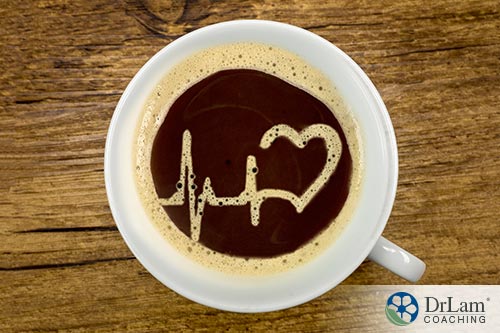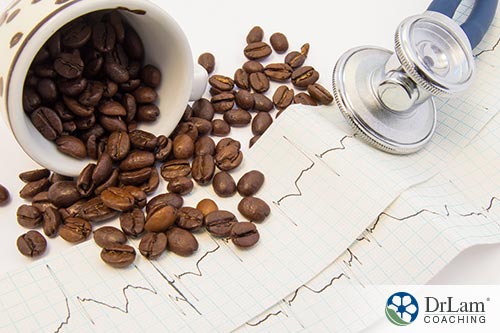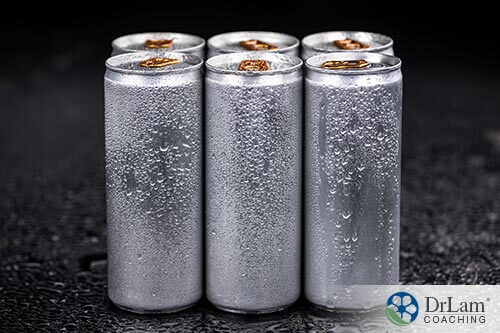 Caffeine is among the best-tested ergogenic aids, meaning it is known to enhance an individual's energy, or recovery times. Because of these actions, it can help athletes train both harder and longer. Caffeine can also stimulate the brain which can improve concentration. However, caffeine has a dark side as well that most athletes have been unaware of. Here’s the deal, there are actually some harmful effects that caffeine may have, particularly when it comes to athletes and caffeine. New evidence has emerged that suggests athletes may want to avoid caffeine in their free time. If you want to know why, then keep on reading.
Caffeine is among the best-tested ergogenic aids, meaning it is known to enhance an individual's energy, or recovery times. Because of these actions, it can help athletes train both harder and longer. Caffeine can also stimulate the brain which can improve concentration. However, caffeine has a dark side as well that most athletes have been unaware of. Here’s the deal, there are actually some harmful effects that caffeine may have, particularly when it comes to athletes and caffeine. New evidence has emerged that suggests athletes may want to avoid caffeine in their free time. If you want to know why, then keep on reading.
Caffeine's nervous system stimulating effects have made it popular among athletes, not only for training, but also for enhancing overall performance. As is well known, caffeine can reduce fatigue and drowsiness. These effects make caffeine great for motivating exercise, and overcoming mental obstacles in general.
As if that were not enough, research has shown that caffeine may also increase muscular strength and even improve endurance. This is great news for any athletes looking to boost their performance. It is no wonder that athletes and caffeine go hand in hand.
Despite the great benefits that many athletes see with caffeine use, new research out of Dublin City University of Ireland sheds some light on one of the possible downsides that combining athletes and caffeine too often may have. Published in the International Journal of Sport Nutrition and Exercise Metabolism, the study headed by Dr. Brendan Egan suggests that regular use of caffeine may actually desensitize athletes to the benefits they seek.
The researchers tested the impacts of caffeine on 18 men who were actively part of sports teams. Each participant was required to take part in 10 to 40 meter sprints. Before each of the sprints, the athletes would chew a piece of gum provided by the research team. This gum would either be caffeinated, or not. The caffeinated gum contained the equivalent amount of caffeine as two cups of strong coffee.
The researchers considered the impacts not only of the caffeine provided by the gum, but also looked at the overall daily consumption of the athletes as well. Each day the caffeine intake of the athletes outside of the study was also monitored. They compared both types of caffeine intake with the results of each of the sprints, and the results were quite astonishing.
The results revealed that male athletes who consumed caffeine on a regular basis, received little benefit from the caffeine gum. In fact, it was discovered that the athletes who consumed three or more cups of coffee daily had a decrease in their performance upon receiving the caffeinated gum.
 However, athletes with lower habitual caffeine intake, maintained their performance through all 10 sprint tests, even after chewing the caffeinated gum. The researchers suggest their findings indicate that regular caffeine intake may actually hamper the performance of an athlete.
However, athletes with lower habitual caffeine intake, maintained their performance through all 10 sprint tests, even after chewing the caffeinated gum. The researchers suggest their findings indicate that regular caffeine intake may actually hamper the performance of an athlete.
To counteract this effect, they recommended that those athletes who regularly consume caffeine should really cut back their caffeine use leading up to any sports performance. In this manner the athletes may retain the benefits that caffeine holds for their athletic performances. The caffeine intake should be reduced gradually over a period of several days. Abrupt discontinuation may lead to symptoms of caffeine withdrawal, resulting in more harm than good.
This is the type of advice that any career athlete should really utilize in their venture to optimize performance. Athletes and caffeine can mix, but only in moderation!
The NEM is made up of two main groups of overlapping circuit breakers. These two groups are the Neuroendocrine and the Metabolism groups. The three circuits of the Neuroendocrine group are the hormonal, neuro-affective, and cardionomic. Whereas, detoxification, inflammation, and metabolism are the three circuits of the Metabolism group. Each of these six circuits make up a network or “stress response” that your body uses to coupe with danger or stress. The NEM stress response system activates the “flight or fight” response. This response network is a major key to our survival, as long as it is functioning correctly.
The fight or flight response is largely lead by the adrenal glands. As a result, one of the biggest, and perhaps most common “system failures” of the NEM response is Adrenal Fatigue Syndrome (AFS). This failure can manifest itself as fatigue, hormonal imbalances, and even the dysfunction of other organs. For example, the AFS is frequently known to cause disorders of the thyroid gland. AFS is largely brought on by the constant stress of the standard way of living.
As with any drug, caffeine has impacts on the subtle circuits of the NEM stress response and the adrenal glands. Light use of caffeine is generally considered safe, and will have little impact on the NEM as far as causing disorder. However, constant overuse of caffeine can trigger your stress response network. This type of use can be harmful, especially in the long run, both to your adrenal glands, and the circuits of the NEM.
Furthermore, caffeine, by acting as a stimulant, can cause you to overwork your body. Caffeine may make you want to stay awake and moving, when your body just needs a break. Caffeine consumption to the point that it is interrupting your body’s sleep and rest cycles can really trigger malfunctions in the circuitry of your NEM. This is why it is critical that if you choose to use caffeine, you monitor your use carefully, particularly if you are looking to mitigate AFS.
 That being said, caffeine use in moderation can actually be beneficial to several of the circuits of your NEM.
That being said, caffeine use in moderation can actually be beneficial to several of the circuits of your NEM.
Despite the results of the study, athletes and caffeine may have more symbiotic relationships than chaotic ones. One study showing some optimistic results of caffeine intake focused on coffee intake, heart health, and risk of stroke. This study found that participants who used caffeine regularly had significant reductions in both the risk of heart disease and stroke. It was found that caffeine appeared to reduce chances of stroke by 8%, and risk of heart disease by 7%.
This suggests that regular intake of coffee may be useful for promoting the neuro-affective and cardionomic stress response circuits. This is likely due to the stimulating actions of caffeine. These actions can stimulate blood flow, and improve circulation. This regular stimulation may prevent the circuits from stagnating and causing disease.
Perhaps one of the most beneficial effects of coffee is its ability to promote a healthy neuroaffect. This can be inferred from studies showing that memory can improve in association with caffeine intake, and perhaps more importantly, caffeine appears to prevent dementia. This is perhaps one of the most important benefits which have been associated with caffeine intake in the recent years, as memory and mental cognition are something we all desire to maintain.
As if those benefits were not enough, caffeine can also improve the body’s ability to detoxify itself. A study led by Zobair Younossi of George Mason University found interesting results on caffeine and its ability to aid in the detoxification of the liver. This study showed the potential of caffeine, in the form of two cups of coffee a day, to prevent non-alcoholic fatty liver disease. The researchers of the study speculate that this is due to caffeine’s ability to alleviate inflammation in the liver. If true, this study is an excellent lens to view the interconnectedness of each network of the NEM. The detoxification circuit of the NEM in this scenario, is interrupted by the inflammatory circuit. Caffeine appears to be able to alleviate liver inflammation, and as such can also help the body with its detoxification circuit as well.
The thing that many of us have forgotten as we wake up to our morning cups of joe is that coffee is actually a drug. This stimulant, though generally safe, should be treated with care. Over use of any drug can have devastating consequences, and caffeine is not any different.
Caffeine is a stimulant which impacts the central nervous system. This means it can have impact on multiple circuits of the NEM Stress Response. Furthermore, caffeine can be an irritant and even stress out the user. Stress of course can lead to Adrenal Fatigue Syndrome (AFS). All of this is not to say that caffeine should be entirely avoided. However, it should be used in moderation, and with respect for the unwanted effects it may carry.
Though caffeine itself is safe in moderation, the source from which the caffeine is derived may not be. Green or black tea, and coffee (with or without cream) are likely the healthiest sources. This is especially true for those who want to support a healthy NEM. Many sources of caffeine are full of sugars, artificial sweeteners, or chemicals that may cause more harm than good.
 Yes, Mt. Dew is a great source of caffeine, but it is also loaded with sugars, artificial dyes, and sweeteners. The same goes for other soft drinks and energy drinks. Energy drinks in particular are loaded with chemicals that can really interfere with your NEM circuits, especially the hormonal circuit. Because the hormonal circuit is so finely tuned, just a slight alteration to it can cause issues in the neuro-affective and metabolic circuits. Due to the impacts these drinks have on the NEM as a whole, we recommend entirely avoiding such sources of caffeine. The risks of getting caffeine from these sources far out way the benefits.
Yes, Mt. Dew is a great source of caffeine, but it is also loaded with sugars, artificial dyes, and sweeteners. The same goes for other soft drinks and energy drinks. Energy drinks in particular are loaded with chemicals that can really interfere with your NEM circuits, especially the hormonal circuit. Because the hormonal circuit is so finely tuned, just a slight alteration to it can cause issues in the neuro-affective and metabolic circuits. Due to the impacts these drinks have on the NEM as a whole, we recommend entirely avoiding such sources of caffeine. The risks of getting caffeine from these sources far out way the benefits.
Pills and gum with caffeine on the other hand, may not be as harmful as energy drinks. However, they often contain chemicals that are likely to interrupt the hormonal circuit of the NEM. For these reasons you should really avoid these sources as well. Though the short-term benefits of caffeine are beneficial to athletes, the long-term impacts of hormonal imbalances could be debilitating.
Be forewarned, coffee can also come loaded with calories and artificial chemicals. Coffee itself has no calories, but if Starbucks frappuccinos are your idea of coffee, be aware that these drinks are loaded with empty calories and unhealthy chemicals. When things begin to get added to coffee like flavored syrups and sweeteners, what was once a healthy cup o’ joe becomes just as unhealthy as energy drinks and likewise.
Do not be deceived into thinking that all caffeine sources are the same. As with any other food, stick to the source. Black coffee or green tea are much better sources of caffeine than other more processed products. Athletes and caffeine can be friends, but be sure to use a good source.
Coffee creamer is a popular additive to coffee, and it tastes great. But there’s a catch. Not only are many coffee creamers filled with harmful chemicals and artificial ingredients, dairy itself can be inflammatory. This means more work for the inflammatory circuit of the NEM. Though yogurt contains powerful probiotics, which we strongly recommend. Dairy itself should be used very sparingly, if at all. Dairy contains several oxidants and inflammatory agents, but on the bright side coffee can help combat this.
Coffee not only carries the awesome potentials which are contained in the caffeine it carries. It has a few extra healing aspects, that most other sources of caffeine do not carry. Coffee beans contain powerful antioxidants. Antioxidants destroy free radicals, which are the cause of oxidative stress. Free radicals are basically unstable elemental bonds. When these unstable bonds go unchecked they can damage cells and trigger the inflammation NEM circuit. Antioxidants like those contained in coffee beans are able to counteract this destructive behavior by neutralizing free radicals. Antioxidants help to counteract this natural oxidation and can extend the life of cells, and aid the inflammation circuit. The result? A healthier overall body.
 Athletes and Caffeine can actually be a good combination. However, you should remember that caffeine is a drug, and that when not used in moderation, it can be detrimental to athletic performance. Individuals looking to support a healthy lifestyle and NEM stress response should not only be mindful of how much caffeine they take in, but also the source from which the caffeine is derived. When it comes to caffeine intake, especially athletes and caffeine, moderation is a must. This is true of all foods, especially those that are deemed as drugs. Be sure to share this with your athletic friends and family members, so that they too may improve their performance with this information.
Athletes and Caffeine can actually be a good combination. However, you should remember that caffeine is a drug, and that when not used in moderation, it can be detrimental to athletic performance. Individuals looking to support a healthy lifestyle and NEM stress response should not only be mindful of how much caffeine they take in, but also the source from which the caffeine is derived. When it comes to caffeine intake, especially athletes and caffeine, moderation is a must. This is true of all foods, especially those that are deemed as drugs. Be sure to share this with your athletic friends and family members, so that they too may improve their performance with this information.
© Copyright 2018 Michael Lam, M.D. All Rights Reserved.
The thing is, athletes and caffeine are generally good for each other. But new research suggests that athletes may actually not be receiving as much from caffeine as they thought. In fact a new study shows that caffeine intake may be harming their performance.

